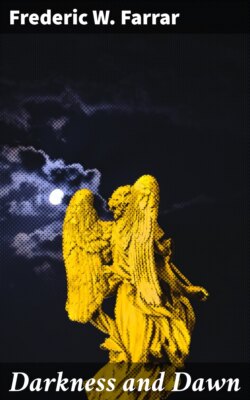Читать книгу Darkness and Dawn - Frederic W. Farrar - Страница 3
На сайте Литреса книга снята с продажи.
PREFACE
ОглавлениеTable of Contents
I have endeavoured to choose a title for this book which shall truly describe its contents. The 'Darkness' of which I speak is the darkness of a decadent Paganism; the 'Dawn' is the dawn of Christianity. Although the story is continuous, I have called it 'Scenes in the Days of Nero,' because the outline is determined by the actual events of Pagan and Christian history, more than by the fortunes of the characters who are here introduced. In other words, the fiction is throughout controlled and dominated by historic facts. The purport of this tale is no less high and serious than that which I have had in view in every other book which I have written. It has been the illustration of a supreme and deeply interesting problem the causes, namely, why a religion so humble in its origin and, so feeble in its earthly resources as Christianity, won so majestic a victory over the power, the glory, and the intellect of the civilised world.
The greater part of the following story has been for some years in manuscript, and, since it was designed, and nearly completed, several books have appeared which deal with the same epoch. Some of these I have not seen. From none of them have I consciously borrowed even the smallest hint.
Those who are familiar with the literature of the first century will recognise that even for the minutest allusions and particulars I have contemporary authority. Expressions and incidents which, to some, might seem to be startlingly modern, are in reality suggested by passages in the satirists, epigrammatists, and romancers of the Empire, or by anecdotes preserved in the grave pages of Seneca and the elder Pliny. I have, of course, so far assumed the liberty accorded to writers of historic fiction as occasionally to deviate, to a small extent, from exact chronology, but such deviations are very trivial in comparison with those which have been permitted to others, and especially to the great masters of historic fiction.
All who know most thoroughly the real features of that Pagan darkness which was deepest before the Christian dawn will see that scarcely even by the most distant allusion have I referred to some of the worst features in the life of that day. While I have not extenuated the realities of cruelty and bloodshed, I have repeatedly softened down their more terrible incidents and details. To have altered that aspect of monotonous misery which pained and wearied its ancient annalist would have been to falsify the real characteristics of the age with which I had to deal.
The book is not a novel, nor is it to be judged as a novel. The outline has been imperatively decided for me by the exigencies of fact, not by the rules of art. I have been compelled to deal with an epoch which I should never have touched if I had not seen, in the features which it presented, one main explanation of an historical event the most sacred and the most interesting on which the mind can dwell.
The same object has made it inevitable that, at least in passing glimpses, the figures of several whose names are surrounded with hallowed associations should appear in these pages. I could not otherwise bring out the truths which it was my aim to set forth. But in this matter I do not think that any serious reader will accuse me of irreverence. Onesimus, Pudens, Claudia, and a few others, must be regarded as imaginary persons, except in name, but scarcely in one incident have I touched the Preachers of early Christianity with the finger of fiction. They were, indeed, men of like passions with ourselves, and as St. Chrysostom says of St. Paul, 'Even if he was Paul, he was yet a man;' but recognising their sacred dignity, I have almost entirely confined their words to words of revelation. Even if I had done more than this, I might plead the grave sanction and example of Dante, and Milton, and Browning. But the small liberty which I have dared to use has only been in directions accorded by the cycle of such early legends as may be considered to be both innocent and hallowed.
F. W. FARRAR
